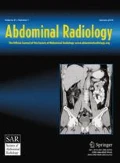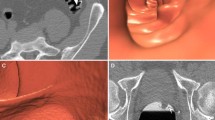Abstract
Published results to date have indicated a good per patient sensitivity of computed tomographic colonography (CTC) for colorectal cancer and for polyps measuring 10 mm or more together with a very good specificity. Sensitivity and specificity for polyps in the range of 6–10 mm are moderate. These results, however, can be achieved only with meticulous attention to technique including adequate colonic distention, and acquisition of supine and prone thin-section computed tomographic (CT) images. Moreover, there is a significant learning curve involved in the interpretation of CTC studies, with performance statistics improving with operator experience. Radiologists must be comfortable in reporting directly from workstation monitors and have access to and be familiar with software for multiplanar and endoluminal reconstructions. In addition to maximize polyp detection and minimize false positive results, reporting radiologists must have a working knowledge of normal colorectal anatomy and pathology on CTC and be familiar with potential pitfalls in interpretation. Besides the description of several possible causes for perceptive errors, also a literature search of perceptive errors in CTC is included in this paper.


















Similar content being viewed by others
References
Sosna J, Morrin MM, Kruskal JB, et al. (2003) CT colonography of colorectal polyps: a metaanalysis. AJR Am J Roentgenol 181(6):1593–1598
Halligan S, Altman DG, Taylor SA, et al. (2005) CT colonography in the detection of colorectal polyps and cancer: systematic review, meta-analysis, and proposed minimum data set for study level reporting. Radiology 237(3):893–904
Mulhall BP, Veerappan GR, Jackson JL (2005) Meta-analysis: computed tomographic colonography. Ann Int Med 142(8):635–650
Atkin WS, Morson BC, Cuzick J (1992) Long-term risk of colorectal cancer after excision of rectosigmoid adenomas. N Engl J Med 326(10):658–662
O’Brien MJ, Winawer SJ, Zauber AG, et al. (1990) Patient and polyp characteristics associated with high-grade dysplasia in colorectal adenomas. Gastroenterology 98(2):371–379
Simons BD, Morrison AS, Lev R, et al. (1992) Relationship of polyps to cancer of the large intestine. J Natl Cancer Inst 84(12):962–966
Waye JD, Lewis BS, Frankel A, et al. (1988) Small colon polyps. Am J Gastroenterol 83(2):120–122
Macari M, Bini EJ, Jacobs SL, et al. (2004) Significance of missed polyps at CT colonography. Am J Roentgenol 183(1):127–134
Arnesen RB, Adamsen S, Svendsen LB, et al. (2005) Missed lesions and false-positive findings on computed-tomographic colonography: a controlled prospective analysis. Endoscopy 37(10):937–944
Aldridge AJ, Simson JN (2001) Histological assessment of colorectal adenomas by size. Are polyps less than 10 mm in size clinically important? Eur J Surg 167(10):777–781
Nusko G, Mansmann U, tendorf-Hofmann A, et al. (1997) Risk of invasive carcinoma in colorectal adenomas assessed by size and site. Int J Colorectal Dis 12(5):267–271
Huang CS, O’Brien MJ, Yang S, et al. (2004) Hyperplastic polyps, serrated adenomas, and the serrated polyp neoplasia pathway. Am J Gastroenterol 99(11):2242–2255
Johnson CD, Harmsen WS, Wilson LA, et al. (2003) Prospective blinded evaluation of computed tomographic colonography for screen detection of colorectal polyps. Gastroenterology 125(2):311–319
Pickhardt PJ, Choi JR, Hwang I, et al. (2003) Computed tomographic virtual colonoscopy to screen for colorectal neoplasia in asymptomatic adults. N Engl J Med 349(23):2191–2200
Rockey DC, Paulson E, Niedzwiecki D, et al. (2005) Analysis of air contrast barium enema, computed tomographic colonography, and colonoscopy: prospective comparison. Lancet 365(9456):305–311
Cotton PB, Durkalski VL, Pineau BC, et al. (2004) Computed tomographic colonography (virtual colonoscopy): a multicenter comparison with standard colonoscopy for detection of colorectal neoplasia. JAMA 291(14):1713–1719
van Gelder RE, Nio CY, Florie J, et al. (2004) Computed tomographic colonography compared with colonoscopy in patients at increased risk for colorectal cancer. Gastroenterology 127(1):41–48
Fidler JL, Fletcher JG, Johnson CD, et al. (2004) Understanding interpretive errors in radiologists learning computed tomography colonography. Acad Radiol 11(7):750–756
Svensson MH, Svensson E, Lasson A, et al. (2002) Patient acceptance of CT colonography and conventional colonoscopy: prospective comparative study in patients with or suspected of having colorectal disease. Radiology 222(2):337–345
van Gelder RE, Birnie E, Florie J, et al. (2004) CT colonography and colonoscopy: assessment of patient preference in a 5-week follow-up study. Radiology 233(2):328–337
Macari M, Lavelle M, Pedrosa I, et al. (2001) Effect of different bowel preparations on residual fluid at CT colonography. Radiology 218(1):274–277
Zalis ME, Hahn PF (2001) Digital subtraction bowel cleansing in CT colonography. AJR Am J Roentgenol. 176(3):646–648
Gryspeerdt S, Lefere P, Herman M, et al. (2005) CT colonography with fecal tagging after incomplete colonoscopy. Eur Radiol 15(6):1192–1202
Lefere P, Gryspeerdt S, Marrannes J, et al. (2005) CT colonography after fecal tagging with a reduced cathartic cleansing and a reduced volume of barium. AJR Am J Roentgenol 184(6):1836–1842
Serlie IWO, Truyen R, Florie J, et al. (2003) Computed cleansing for virtual colonoscopy using a three-material transition model. In: Peters TM, Ellis RE, (eds). Medical image computing and computer-assisted intervention—MICCAI 2003. Proceedings of the 6th international conference in Montreal, Canada, November 15–18, part 2. Lecture notes in computer science, vol 2879, pp 175–183. 3. Springer Berlin Heidelberg New York
Pickhardt PJ, Choi JH (2003) Electronic cleansing and stool tagging in CT colonography: advantages and pitfalls with primary three-dimensional evaluation. AJR Am J Roentgenol 181(3):799–805
Johnson CD, Dachman AH (2000) CT colonography: the next colon screening examination? Radiology 216(2):331–341
Taylor SA, Halligan S, Goh V, et al. (2003) Optimizing colonic distention for multi-detector row CT colonography: effect of hyoscine butylbromide and rectal balloon catheter. Radiology 229(1):99–108
Rogalla P, Lembcke A, Ruckert JC, et al. (2005) Spasmolysis at CT colonography: butyl scopolamine versus glucagon. Radiology 236(1):184–188
Morrin MM, Farrell RJ, Keogan MT, et al. (2002) CT colonography: colonic distention improved by dual positioning but not intravenous glucagon. Eur Radiol 12(3):525–530
Yee J, Hung RK, Akerkar GA, et al. (1999) The usefulness of glucagon hydrochloride for colonic distention in CT colonography. AJR Am J Roentgenol 173(1):169–172
Church J, Delaney C (2003) Randomized, controlled trial of carbon dioxide insufflation during colonoscopy. Dis Colon Rectum 46(3):322–326
Grant DS, Bartram CI, Heron CW (1986) A preliminary study of the possible benefits of using carbon dioxide insufflation during double-contrast barium enema. Br J Radiol 59(698):190–191
Fletcher JG, Johnson CD, Welch TJ, et al. (2000) Optimization of CT colonography technique: prospective trial in 180 patients. Radiology 216(3):704–711
Gluecker TM, Johnson CD, Harmsen WS, et al. (2003) Colorectal cancer screening with CT colonography, colonoscopy, and double-contrast barium enema examination: prospective assessment of patient perceptions and preferences. Radiology 227(2):378–384
Taylor SA, Halligan S, Saunders BP, et al. (2003) Acceptance by patients of multidetector CT colonography compared with barium enema examinations, flexible sigmoidoscopy, and colonoscopy. AJR Am J Roentgenol 181(4):913–921
Vos FM, van Gelder RE, Serlie IW, et al. (2003) Three-dimensional display modes for CT colonography: conventional 3D virtual colonoscopy versus unfolded cube projection. Radiology 228(3):878–885
Burling D, Taylor SA, Halligan S, et al. (2006) Automated insufflation of carbon dioxide for MDCT colonography: distension and patient experience compared with manual insufflation. AJR Am J Roentgenol 186(1):96–103
Fletcher JG, Johnson CD, Maccarty RL, et al. (1999) CT colonography: potential pitfalls and problem-solving techniques. AJR Am J Roentgenol 172(5):1271–1278
Macari M, Megibow AJ (2001) Pitfalls of using three-dimensional CT colonography with two-dimensional imaging correlation. AJR Am J Roentgenol 176(1):137–143
Gluecker TM, Fletcher JG, Welch TJ, et al. (2004) Characterization of lesions missed on interpretation of CT colonography using a 2D search method. AJR Am J Roentgenol 182(4):881–889
Park SH, Ha HK, Kim MJ, et al. (2005) False-negative results at multi-detector row CT colonography: multivariate analysis of causes for missed lesions. Radiology 235(2):495–502
Taylor SA, Halligan S, Bartram CI (2003) CT colonography: methods, pathology and pitfalls. Clin Radiol 58(3):179–190
O’Connor SD, Summers RM, Choi JR, et al. (2006) Oral contrast adherence to polyps on CT colonography. J Comput Assist Tomogr 30(1):51–57
Laks S, Macari M, Bini EJ (2004) Positional change in colon polyps at CT colonography. Radiology 231(3):761–766
Chen JC, Dachman AH (2006) Cecal mobility: a potential pitfall of CT colonography. AJR Am J Roentgenol 186(4):1086–1089
Juchems MS, Fleiter TR, Pauls S, et al. (2006) CT colonography: comparison of a colon dissection display versus 3D endoluminal view for the detection of polyps. Eur Radiol 16(1):68–72
Hoppe H, Quattropani C, Spreng A, et al. (2004) Virtual colon dissection with CT colonography compared with axial interpretation and conventional colonoscopy: preliminary results. AJR Am J Roentgenol 182(5):1151–1158
Oto A, Gelebek V, Oguz BS, et al. (2003) CT attenuation of colorectal polypoid lesions: evaluation of contrast enhancement in CT colonography. Eur Radiol 13(7):1657–1663
van Gelder RE, Florie J, Nio CY, et al. (2006) A comparison of primary two- and three-dimensional methods to review computed tomographic colonography. Eur Radiol [in press]
Fidler JL, Johnson CD, Maccarty RL, et al. (2002) Detection of flat lesions in the colon with CT colonography. Abdom Imaging 27(3):292–300
Pickhardt PJ, Nugent PA, Choi JR, et al. (2004) Flat colorectal lesions in asymptomatic adults: implications for screening with CT virtual colonoscopy. AJR Am J Roentgenol 183(5):1343–1347
Hurlstone DP, Cross SS, Adam I, et al. (2003) A prospective clinicopathological and endoscopic evaluation of flat and depressed colorectal lesions in the United Kingdom. Am J Gastroenterol 98(11):2543–2549
Rembacken BJ, Fujii T, Cairns A, et al. (2000) Flat and depressed colonic neoplasms: a prospective study of 1000 colonoscopies in the UK. Lancet 355(9211):1211–1214
Wolber RA, Owen DA (1991) Flat adenomas of the colon. Hum Pathol 22(1):70–74
Maccarty RL, Johnson CD, Fletcher JG, et al. (2006) Occult colorectal polyps on CT colonography: implications for surveillance. AJR Am J Roentgenol 186(5):1380–1383
Kudo S (1993) Endoscopic mucosal resection of flat and depressed types of early colorectal cancer. Endoscopy 25(7):455–461
Kudo S, Tamure S, Nakajima T, et al. (1995) Depressed type of colorectal cancer. Endoscopy 27(1):54–57
Rubio C, Watanabe T, Masaki T, et al. (1997) Histologic differences between flat tubular colorectal neoplasias in Japan and Sweden. In Vivo 11(1):93–94
Rubio CA, Kumagai J, Kanamori T, et al. (1995) Flat adenomas and flat adenocarcinomas of the colorectal mucosa in Japanese and Swedish patients. Comparative histologic study. Dis Colon Rectum 38(10):1075–1079
Saitoh Y, Waxman I, West AB, et al. (2001) Prevalence and distinctive biologic features of flat colorectal adenomas in a North American population. Gastroenterology 120(7):1657–1665
Tsuda S, Veress B, Toth E, et al. (2002) Flat and depressed colorectal tumours in a southern Swedish population: a prospective chromoendoscopic and histopathological study. Gut 51(4):550–555
Park SH, Ha HK, Kim AY, et al. (2006) Flat polyps of the colon: detection with 16-MDCT colonography–preliminary results. AJR Am J Roentgenol 186(6):1611–1617
Macari M, Bini EJ, Xue X, et al. (2002) Colorectal neoplasms: prospective comparison of thin-section low-dose multi-detector row CT colonography and conventional colonoscopy for detection. Radiology 224(2):383–392
Rex DK, Vining D, Kopecky KK (1999) An initial experience with screening for colon polyps using spiral CT with and without CT colography (virtual colonoscopy). Gastrointest Endosc 50(3):309–313
Yee J, Akerkar GA, Hung RK, et al. (2001) Colorectal neoplasia: performance characteristics of CT colonography for detection in 300 patients. Radiology 219(3):685–692
Taylor SA, Halligan S, Burling D, et al. (2004) CT colonography: effect of experience and training on reader performance. Eur Radiol 14(6):1025–1033
[Blinded for review]. Performance of radiographers in the evaluation of CT colonography (in press)
Bodily KD, Fletcher JG, Engelby T, et al. (2005) Nonradiologists as second readers for intraluminal findings at CT colonography. Acad Radiol 12(1):67–73
Burling D, Halligan S, Altman DG, et al. (2006) CT colonography interpretation times: effect of reader experience, fatigue, and scan findings in a multi-centre setting. Eur Radiol 16(8):1745–1749
[Blinded for review]. Effect of directed training on reader performance for CT colonography: multi-center study (in press)
Summers RM, Yao J, Pickhardt PJ, et al. (2005) Computed tomographic virtual colonoscopy computer-aided polyp detection in a screening population. Gastroenterology 129(6):1832–1844
Author information
Authors and Affiliations
Corresponding author
Rights and permissions
About this article
Cite this article
Nio, C.Y., de Vries, A.H. & Stoker, J. Perceptive errors in CT colonography. Abdom Imaging 32, 556–570 (2007). https://doi.org/10.1007/s00261-006-9170-4
Published:
Issue Date:
DOI: https://doi.org/10.1007/s00261-006-9170-4




